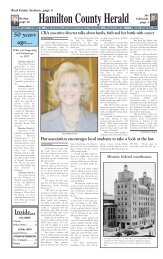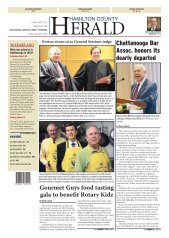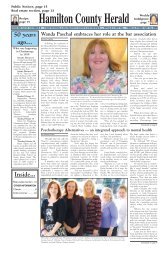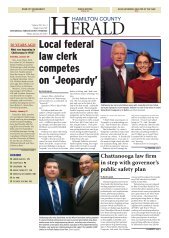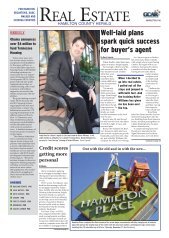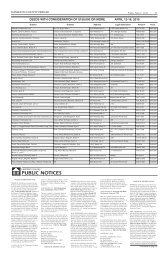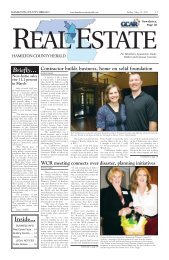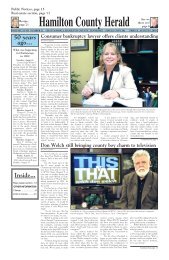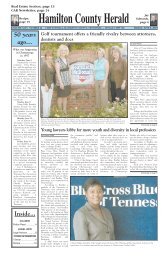HCH March 25 2011 Legal - Chattanooga Bar Association
HCH March 25 2011 Legal - Chattanooga Bar Association
HCH March 25 2011 Legal - Chattanooga Bar Association
You also want an ePaper? Increase the reach of your titles
YUMPU automatically turns print PDFs into web optimized ePapers that Google loves.
2 Friday, <strong>March</strong> <strong>25</strong>, <strong>2011</strong> www.hamiltoncountyherald.com<br />
HAMILTON COUNTY HERALD<br />
Technology Continued from page 1<br />
demonstrates products and does<br />
hearing assessments to size up a<br />
person’s needs. The individual<br />
can then purchase the equipment<br />
that will help him or her<br />
from a vendor.<br />
“We also do assessments<br />
for Rehabilitation Services of<br />
Tennessee. In those cases, the<br />
State purchases the devices.<br />
Businesses have also utilized us<br />
to help employees who are hard<br />
of hearing function better on the<br />
job,” Davenport says.<br />
The Technology Center does<br />
have some equipment it can<br />
loan to individuals who are not<br />
vocational rehabilitation clients<br />
and can’t afford to purchase the<br />
devices on their own.<br />
As the world around<br />
Huffman opened up for the<br />
first time, she made the most of<br />
the opportunities her improved<br />
hearing presented. She earned a<br />
bachelor’s degree in marketing at<br />
East Tennessee State University,<br />
and then went through vocational<br />
rehabilitation at Signal<br />
Centers. Huffman then became<br />
a VISTA volunteer at Signal<br />
Centers through AmeriCorps,<br />
a national service program<br />
designed to fight poverty.<br />
Today, Huffman is using<br />
her marketing skills to help the<br />
Technology Center spread the<br />
word about its services, including<br />
its expos, which are designed<br />
to raise awareness about the<br />
technology that’s available to<br />
help deaf people, senior citizens,<br />
returning soldiers and more.<br />
As part of her yearlong,<br />
full-time commitment to Signal<br />
Centers, Huffman developed a<br />
free packet designed to help people<br />
avoid noise-induced hearing<br />
loss. Complete with two earplugs,<br />
capable of reducing audio<br />
levels in conditions as extreme<br />
as a NASCAR race, and an<br />
instruction card, the kit is available<br />
to anyone who would like<br />
one.<br />
“Noise-induced hearing loss<br />
is going to be a big problem for<br />
my generation because of ear<br />
buds. Ear buds aren’t the best<br />
things to wear when listening to<br />
Pay parking lots increase in number in downtown area<br />
SAVE THE DATE<br />
The Pro Bono Committee of the <strong>Chattanooga</strong> <strong>Bar</strong> <strong>Association</strong>,<br />
the Young Lawyers Division and <strong>Legal</strong> Aid of East Tennessee<br />
Present<br />
Pro Bono Night <strong>2011</strong><br />
Thursday May 26th<br />
5:30-8:00 p.m.<br />
Lindsay Street Hall<br />
Lindsay St., <strong>Chattanooga</strong><br />
Join us as we honor the members of the bar and bench who donate<br />
their time and talent to help low-income and vulnerable members<br />
of our community achieve access to justice.<br />
Heavy hors d’ oeuvres, wine and beer will be served.<br />
A live auction will feature a low country boil for 6 prepared by<br />
Judge Hollingsworth and many other exciting items.<br />
Special Guest<br />
Cornelia Clark<br />
Tennessee Supreme Court Chief Justice<br />
We are honored to have Chief Justice Connie Clark<br />
provide opening remarks and participate in the presentation of awards.<br />
Tickets are $<strong>25</strong><br />
To purchase tickets and RSVP contact Matthew Smith at msmith@laet.org<br />
When to wear ear protection<br />
• When riding a motorcycle;<br />
• At loud sporting events;<br />
• While attending live music concerts;<br />
• When performing with a band or orchestra;<br />
• While operating heavy machinery;<br />
• At a firing range or while hunting; and<br />
• While using loud equipment, such as a lawn mower,<br />
chainsaw or jackhammer.<br />
an iPod (or another MP3 player)<br />
because they don’t block outside<br />
noise, so you crank up the volume<br />
to hear the music.<br />
“That’s bad for your ears,<br />
especially when you listen for<br />
more than an hour. It would<br />
be better to listen with noise-<br />
Workers install the Republic Parking pay boxes and machines at the former Unum employee lots downtown last week. The installation of these<br />
boxes means that the previous “free parking” at these lots after Unum hours and on weekends will no longer be available. Unum’s new parking deck<br />
for their employees is located on Cherry Street. (Erica Tuggle)<br />
By Wally Northway<br />
The Daily Record Newswire<br />
A decision recently rendered<br />
by the U.S. Supreme Court opens<br />
employers to liability for discriminatory<br />
employment practices in<br />
a theory that up until the ruling<br />
had gained little traction in the<br />
higher courts.<br />
Now, human resources<br />
managers need to be aware that<br />
the “cat’s paw” liability theory<br />
has been deemed constitutional<br />
and holds broad implications for<br />
employment practices moving<br />
forward.<br />
Earlier this month, the<br />
Supreme Court ruled unanimously<br />
in Staub v. Proctor<br />
Hospital that the hospital was<br />
guilty of discriminatory employment<br />
practices against Staub.<br />
The hospital had taken prior<br />
disciplinary action against Staub<br />
for what it deemed poor work<br />
performance. However, Staub<br />
maintained that his immediate<br />
supervisors discriminated against<br />
him because of his military service<br />
commitment, in violation<br />
of The Uniformed Services<br />
Employment and Reemployment<br />
Rights Act of 1994, and were<br />
angling to have him terminated,<br />
which eventually he was.<br />
The decision-maker in his<br />
termination was not one of his<br />
immediate supervisors, but the<br />
hospital’s vice president of human<br />
resources. The decision-maker<br />
cancelling earphones or ear buds<br />
that have foam. When people<br />
who are my age reach 30 or 40,<br />
a lot of them are going to have<br />
noise-induced hearing loss, and<br />
they’re going to need amplified<br />
hearing products,” she says.<br />
Even with her hearing aids<br />
and other devices, Huffman<br />
still has her share of challenges.<br />
She has a hard time holding<br />
conversations with people who<br />
speak quietly, and when a siren<br />
is approaching, she’s unable to<br />
determine its bearing. When<br />
it comes to entertainment, she<br />
can’t understand the words of<br />
most pop songs because the<br />
music overpowers the lyrics, and<br />
she rarely goes to the movies<br />
because she has difficulty hearing<br />
the dialogue.<br />
“I’ve become dependent on<br />
closed captioning and subtitles. I<br />
don’t like having to rely on technology,<br />
but it’s something I have<br />
to get used to,” she says.<br />
Moving forward, Huffman<br />
plans to find a marketing job<br />
and to continue to spread the<br />
word about noise-induced hearing<br />
loss.<br />
“I want to protect the hearing<br />
I have while I still have it,<br />
and I want to encourage others<br />
to do the same,” she says.<br />
For more information about<br />
the Technology Center, visit<br />
www.signalcenters.org, click on<br />
“Programs” and select “Assistive<br />
Technology.” v<br />
Supreme Court puts claws<br />
in ‘cat’s paw’ theory<br />
maintained that she decided to<br />
terminate Staub because of poor<br />
performance and not because of<br />
his military service.<br />
However, the Supreme<br />
Court ruled it found evidence<br />
that the decision-maker’s actions<br />
were motivated by Staub’s immediate<br />
supervisors, whose bias to<br />
his military service was unlawful.<br />
Thus, the decision-maker’s<br />
action was also unlawful.<br />
This is commonly referred<br />
to as the “cat’s paw” theory of<br />
liability. The term was coined<br />
from the 17th-century fable “The<br />
Monkey and The Cat” written by<br />
French poet Jean de La Fontaine.<br />
In the fable, the unscrupulous<br />
monkey dupes the cat into raking<br />
some chestnuts out of a fire.<br />
The monkey promptly eats the<br />
chestnuts, leaving the cat with<br />
nothing but burnt paws.<br />
Thus, “cat’s paw” refers<br />
to one party using another to<br />
accomplish his or her purposes.<br />
In Staub v. Proctor Hospital,<br />
the Supreme Court ruled that<br />
the decision-maker was used by<br />
Staub’s immediate supervisors to<br />
an end – the termination of<br />
Staub.<br />
Brooks Eason, an employment<br />
attorney and shareholder<br />
in the Jackson office of Baker,<br />
Donelson, Bearman, Caldwell &<br />
Berkowitz, PC, said the “cat’s<br />
paw” theory had percolated<br />
Continued on page 9



